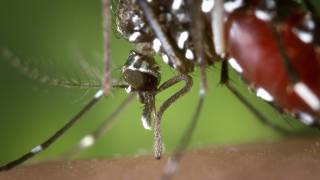Texas Expands Aerial Spraying to Kill Mosquitoes

The Texas Department of State Health Services (DSHS) is expanding its effort to control mosquitoes in Texas after Hurricane Harvey.
Texas Governor Greg Abbott said on September 5th that ‘local spraying already has been started to thwart mosquito breeding in floodwaters across Houston.’
The DSHS will begin aerial spraying over Harris County Thursday night, September 13, 2017. Aerial spraying is done between dusk and dawn when most mosquitoes are more active and to limit the impact on beneficial insects, such as honeybees.
According to DSHS, aerial application of insecticide, when applied according to label instructions by a licensed professional, is the most effective way to rapidly reduce the number of mosquitoes in a large area and does not present a risk to people, pets or other animals.
This more aggressive mosquito control effort may include spraying of Naled (DIBROM).
Naled is an insecticide in the organophosphate family, a class of chemicals that includes nerve agents like sarin gas. They inhibit an enzyme involved in the nerve signaling process, paralyzing insects and triggering respiratory failure.
Texas DAHA says if people prefer to stay inside and close windows and doors when spraying takes place they can, but it is not necessary.
According to Dr. Umair A. Shah, executive director of Harris County Public Health, “The goal is to reduce the effects mosquitoes are having on recovery efforts and the possibility of a future increase in mosquito-borne disease.”
A small amount of DIBROM, one to two tablespoons per acre, is dispersed by airplanes equipped with nozzles that create ultra-low volume droplets just the right size to kill mosquitoes.
The tiny droplets are calibrated to float in the air and kill adult mosquitoes on contact while limiting exposure to other animals and people. Droplets quickly break down in sunlight and water.
Texas has already treated more than 2 million acres in Aransas, Bee, Brazoria, Calhoun, Chambers, DeWitt, Jackson, Jefferson, Lavaca, Nueces, Orange, Refugio and San Patricio counties.
A third C-130 from the Air Force Reserve’s 910th Airlift Wing will be flying in support of Texas’ spraying operation.
People can help control mosquitoes during the hurricane recovery effort by dumping standing water around their homes and applying a commercially available larvicide in water that can’t be drained.
Texas DSHS recommends people should also avoid mosquito bites by using an EPA-registered mosquito repellent every time they go outside and making sure their window and door screens are in good repair after the storm to keep mosquitoes out of homes.
Texas Medicaid has issued a ‘Standing Order” to pharmacies for mosquito repellent as a free benefit without needing a prescription. The 2017 benefit includes up to two cans per month per eligible beneficiary.
Texas Health Commissioner Charles Smith said, “The best way to protect yourself from the Zika virus is by using mosquito repellent.”
The 2017 benefit is for pregnant women, women ages 10-55, and males age 14 and up who are enrolled in Medicaid managed care, fee-for-service, the Children’s Health Insurance Program and CHIP-Perinatal programs.
In addition, individuals who meet the eligibility criteria for Healthy Texas Women, Children with Special Health Care Needs, or the Family Planning Program can receive the benefit. Eligible clients in these programs require a prescription..
But some future mothers worry that the DEET repellents themselves might pose a health threat to an unborn child.
The authors of a new research say DEET is “good-to-go.”
"Given what we know about both Zika and DEET, the evidence overwhelmingly favors the use of DEET-containing products," said Dr. Blair Wylie, from Harvard Medical School.
Dr. Wylie’s research team noted that a 1998 Environmental Protection Agency review determined that DEET posed no health risk to users. The EPA reaffirmed that finding in 2014.
Products containing DEET currently are available to the public in a variety of liquids, lotions, sprays, and impregnated materials (e.g., towelettes, roll on). Formulations registered for direct application to human skin contain 5% to 99% DEET.
Except for a few veterinary uses, DEET is registered for use by consumers, and should not be used on food.
Media Contact: Chris Van Deusen, DSHS Director of Media Relations, 512-776-7119.
Our Trust Standards: Medical Advisory Committee
- Texas Expands Aerial Fight against Mosquitoes
- Questions about Aerial Mosquito Control
- Texas to Conduct Aerial Mosquito Control in Wake of Hurricane Harvey
- Chemicals used to combat Zika, agricultural pests impact motor skills in infants
- Texas Medicaid Mosquito Repellent Benefit Aims To Protect Texans
- Researchers Say DEET Repellents Safe in Pregnancy to Prevent Zika
- Harris County Alerts









